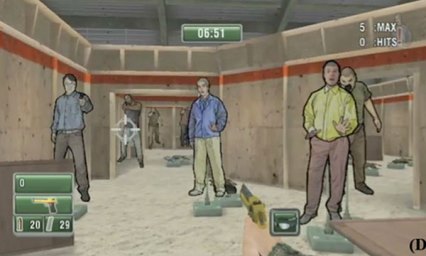Study: Training law-enforcement “itchy brains” can reduce shooting-related civilian casualties

.
Brain Training May Help Avoid Civilian Casualties (Duke Today):
“Although firing a gun seems like one action, it is made up of many smaller decisions and movements that require coordination between multiple brain areas.
The sudden decision to not shoot, called ‘response inhibition,’ is critical when someone innocent comes into the line of fire. That is what soldiers in war experience when they’re about to pull the trigger and then realize that their target is a civilian or an ally. Or when a law enforcement officer realizes that a person they thought was armed and dangerous is actually an innocent bystander.
A new Duke study exploring the causes of civilian shooting casualties suggests that mistakes arise from problems with attention — an “itchy brain,” the authors say — rather than an “itchy trigger finger.”
The findings, published online in Psychological Science, imply that the tendency to squeeze the trigger in error can not only be predicted with cognitive tests but can also be overcome by training in response inhibition…
The researchers now hope to determine which aspect of the response inhibition training made the difference. They will also try to see how long the training might last.”
Study: Cognitive training can reduce civilian casualties in a simulated shooting environment (Psychological Science)
- Abstract: Shooting a firearm involves a complex series of cognitive abilities. For example, locating an item or a person of interest requires visual search, and firing the weapon (or withholding a trigger squeeze) involves response execution (or inhibition). The present study used a simulated shooting environment to establish a relationship between a particular cognitive ability and a critical shooting error—response inhibition and firing on civilians, respectively. Individual-difference measures demonstrated, perhaps counterintuitively, that simulated civilian casualties were not related to motor impulsivity (i.e., an itchy trigger finger) but rather to an individual’s cognitive ability to withhold an already initiated response (i.e., an itchy brain). Furthermore, active-response-inhibition training reduced simulated civilian casualties, which revealed a causal relationship. This study therefore illustrates the potential of using cognitive training to possibly improve shooting performance, which might ultimately provide insight for military and law-enforcement personnel.
Learn more:


